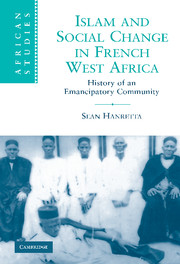Book contents
- Frontmatter
- Contents
- List of maps and figures
- Acknowledgments
- Note on orthographic conventions
- Abbreviations used in references
- Introduction
- Part One “The Suffering of Our Father”: Story and Context
- Part Two “I Will Prove to You That What I Say Is True”: Knowledge and Colonial Rule
- Part Three “What Did He Give You?”: Interpretation
- 6 Lost Origins: Women and Spiritual Equality
- 7 The Spiritual Economy of Emancipation
- 8 The Gift of Work: Devotion, Hierarchy, and Labor
- 9 “To Never Shed Blood”: Yacouba, Houphouët, and Côte d'Ivoire
- Conclusions
- Glossary
- Note on References
- Index
- Books in This Series
8 - The Gift of Work: Devotion, Hierarchy, and Labor
Published online by Cambridge University Press: 15 December 2009
- Frontmatter
- Contents
- List of maps and figures
- Acknowledgments
- Note on orthographic conventions
- Abbreviations used in references
- Introduction
- Part One “The Suffering of Our Father”: Story and Context
- Part Two “I Will Prove to You That What I Say Is True”: Knowledge and Colonial Rule
- Part Three “What Did He Give You?”: Interpretation
- 6 Lost Origins: Women and Spiritual Equality
- 7 The Spiritual Economy of Emancipation
- 8 The Gift of Work: Devotion, Hierarchy, and Labor
- 9 “To Never Shed Blood”: Yacouba, Houphouët, and Côte d'Ivoire
- Conclusions
- Glossary
- Note on References
- Index
- Books in This Series
Summary
Capitalism is a purely cultic religion, perhaps the most extreme that ever existed. In capitalism, things have a meaning only in their relationship to the cult. … [It] is the celebration of a cult sans rêve et sans merci. … There is no day that is not a feast. …
– Walter Benjamin “Capitalism as Religion”The history of work in West Africa is obscured by scholarly practices that divide studies of religion as ideational and rhetorical from the analysis of religious “networks” as social institutions of forms of cultural capital, and that, more generally, isolate the history of colonial social change from that of African intellectual traditions. The Yacoubists explicitly understood their religious and economic practices as of a piece. Rather than linking their experiences to stories similar only in their “shared relationship to [some] relevant European category” like “commoditization” or “labor,” and thereby reinforcing the implicit coherence of European knowledges and the fragmentation of all others, the Yacoubists' visions of their own history call into question the very categories of economic activity and individualization that define the colonial era for most scholars. By the late 1930s, when the community had come fully into being both in Côte d'Ivoire and Kaédi, its defining features were the collective organization of work, the sharing of all property, and the successful accumulation of wealth.
- Type
- Chapter
- Information
- Islam and Social Change in French West AfricaHistory of an Emancipatory Community, pp. 227 - 252Publisher: Cambridge University PressPrint publication year: 2009



